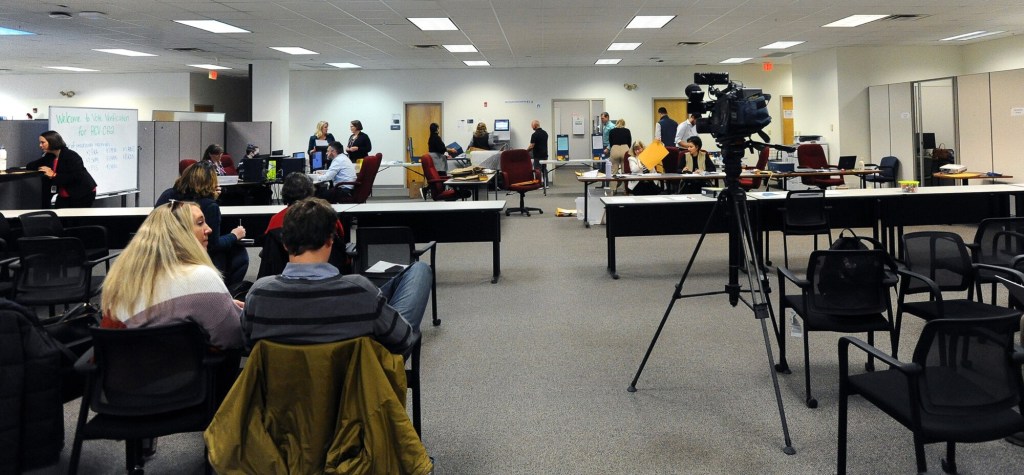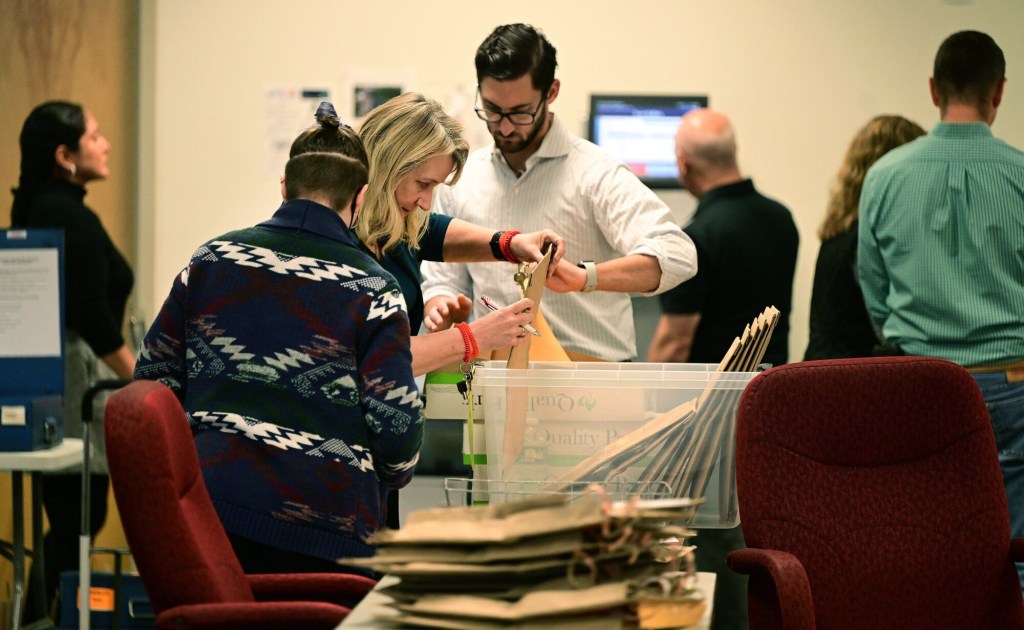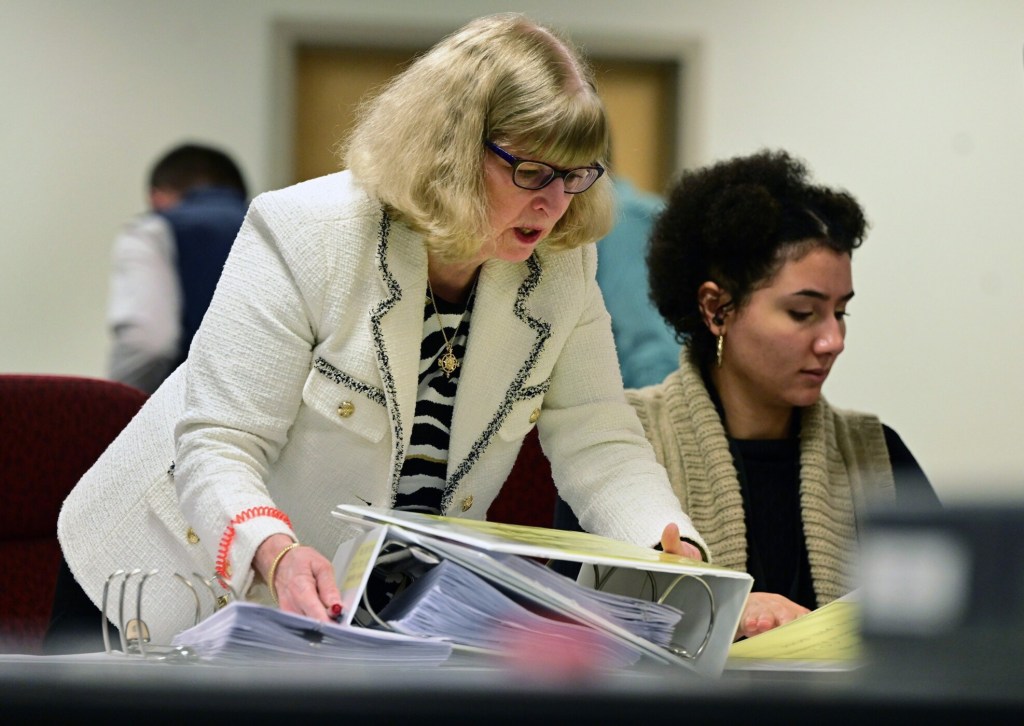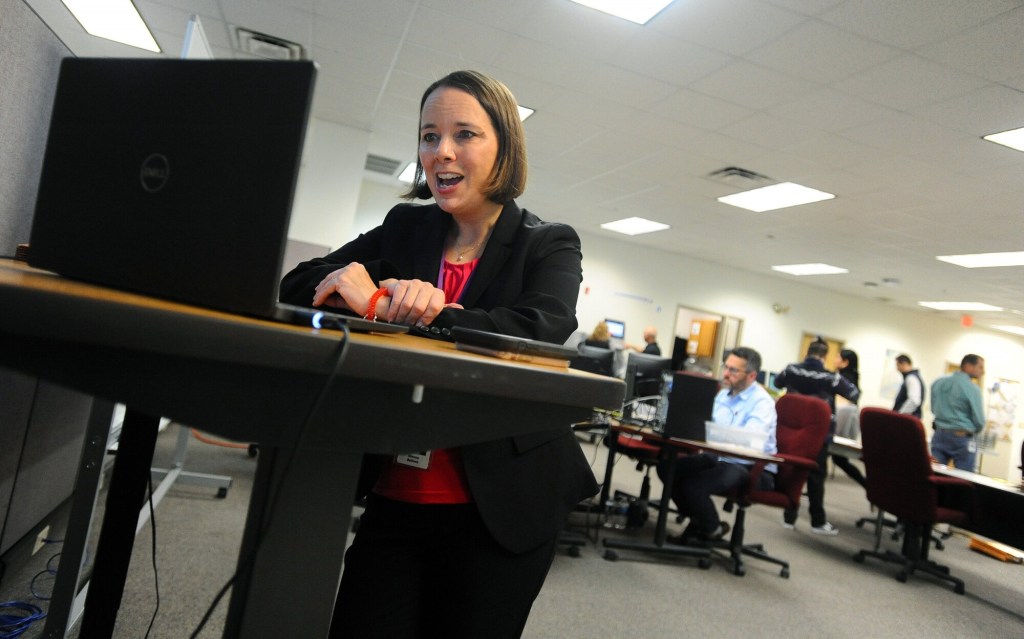AUGUSTA — The state expects to finish counting the votes in Maine’s 2nd Congressional District on Wednesday evening in a race in which Lewiston’s Jared Golden is greatly favored to have won reelection to the U.S. House seat he has held since 2018.
Secretary of State Shenna Bellows said 33 boxes of ballots will have to be counted on Wednesday to finish tallying the results because two memory sticks, from Bangor and Hampden, did not work properly.
“Tonight, we will retrieve all of the ballots,” she said, and then run them through a high-speed tabulator on Wednesday.
At the end of the first round, Golden had 153,051 votes, or 48.4%, while Republican Bruce Poliquin had 141,191, or 44.7%, and independent Tiffany Bond had 21,581, or 6.8%.
Since none of them garnered a majority, the candidate with the least votes, Bond, will be dropped from contention and all of her ballots reallocated to whichever alternative they’d selected as their number two pick.
For Poliquin to win, he will need to garner the support of at least two-thirds of Bond’s voters, a scenario that’s exceedingly unlikely since she specifically said she would never vote for him. Additionally, when the three candidates were on the ballot together in 2018, most of her voters broke for Golden in the second round.

Assistant Director of Elections Heidi Peckham, center, handles sealed envelopes Tuesday from towns that use tabulators for voting during the ranked-choice vote count at the state’s Burton Cross Office Building in Augusta. The tabulations are for the 2nd Congressional District race. Rich Abrahamson/Morning Sentinel
Bond said Tuesday on Twitter that the 21,581 voters who picked her as their number one choice didn’t get the candidate they wanted in the winner’s circle.
But, she said, “they did help strip the power away from the obscene money in politics and they have the power to pick the winner.”
The process of counting the ranked-choice voting ballots began last week when state police began collecting locked ballot boxes from municipal clerks throughout the district.
On Monday, election officials started scanning the ballots town-by-town to tabulate all of the votes cast.
“We go town by town, county by county, checking the totals,” Bellows said. She called it “a very careful and deliberative process.”
Bellows said they started with Aroostook and Washington counties because they are the furthest from Augusta. If there were any problems, she said, state police were standing by to assist, including with a plane to speed delivery if any ballot boxes are found to be missing.
“Every vote matters. Every vote will be counted,” Bellows said. “It’s extraordinarily important.”

Maine Secretary of State Shenna Bellows uses a laptop as she speaks to the public Tuesday during a Facebook Live feed that was part of the ranked choice tabulations at the Maine State Office building in Augusta. The tabulation process, that involved about 15 people, is shown at the right. Rich Abrahamson/Morning Sentinel
‘QUADRUPLE CHECKED’
It isn’t much to watch, just people taking piles of ballots from boxes, running them through a high-speed tabulator and then putting them back in boxes.
It’s easier dealing with the results from less rural areas because many bigger municipalities have tabulators at the polls that can scan the ballots right away. Voters themselves feed them into the machines after they’ve marked their choices.
Each of those tabulators has a memory device that is checked, recorded and shipped to Augusta as well, where the results are fed into the central count.
Police officers are on hand at every step to keep an eye on everyone and ensure there are no hitches. The entire counting process is also done in full view of anyone who showed up to watch, including the media and representatives from the candidates and the political parties.
Bellows said that during the count, “Everything is getting checked, double checked, triple checked, quadruple checked.”
At one point, she mentioned that officials found a discrepancy of 10 votes between what they tabulated in Augusta and the results reported from Kingsbury Plantation on Election Day. That sent authorities scrambling to figure out what happened. It turned out that an envelope containing the 10 ballots for the tiny town had been overlooked in a box full of ballots. Once they were run through in Augusta, the local and state tallies matched.
More than a few observers mentioned it’s like watching paint dry. But Bellows said the process “should be boring” since it requires such care.
The tabulators used by the state and larger towns and cities, Bellows said, are never connected to the internet so they can’t be hacked. Those tabulators as well as the high-speed one used in Augusta, she said, are akin to “a modern-day abacus.”
The process of counting votes was smoother this year than in 2018 when Golden squeaked by Poliquin in the second round of the nations’ first federal ranked-choice voting race. That year, counting took much longer, mostly because of difficulties in getting all of the ballots from small towns to the central counting location in Augusta.
This year, the secretary of state’s office was ready to collect the ballots, speeding up the process and shaving a couple of days off the timetable for reporting the result.
Golden in 2018 trailed Poliquin by 2,071 votes at the end of the first round. But in the end, he won by more than 3,500 votes because so many independents picked him second rather than Poliquin.
Copy the Story LinkSend questions/comments to the editors.







Success. Please wait for the page to reload. If the page does not reload within 5 seconds, please refresh the page.
Enter your email and password to access comments.
Hi, to comment on stories you must . This profile is in addition to your subscription and website login.
Already have a commenting profile? .
Invalid username/password.
Please check your email to confirm and complete your registration.
Only subscribers are eligible to post comments. Please subscribe or login first for digital access. Here’s why.
Use the form below to reset your password. When you've submitted your account email, we will send an email with a reset code.